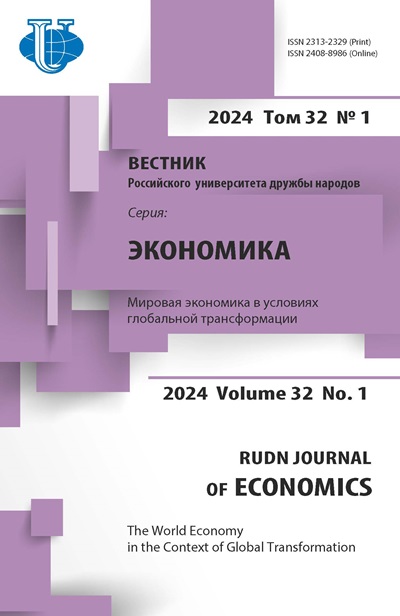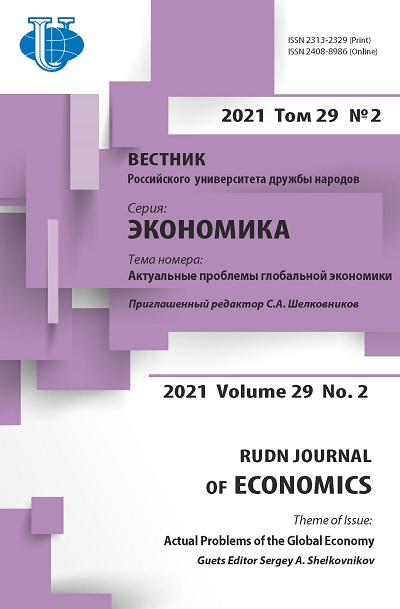Latin American regionalism and trade agreements with the European Union: experiences and approaches
- Authors: Tayar V.M.1
-
Affiliations:
- Institute of Latin America of the Russian Academy of Sciences
- Issue: Vol 29, No 2 (2021): ACTUAL PROBLEMS OF THE GLOBAL ECONOMY
- Pages: 413-425
- Section: Economic integration and globalization
- URL: https://journals.rudn.ru/economics/article/view/26899
- DOI: https://doi.org/10.22363/2313-2329-2021-29-2-413-425
Cite item
Full Text
Abstract
The article deals with the issues of trade cooperation between the European Union and Latin America and the Caribbean region (LAC). The characteristics of interregional trade are presented, and trade interaction between the EU and the subregional blocks of the LAC is analyzed. The author shows that Latin American regionalism predetermines the EU's approaches to trade and economic cooperation with LAC. Despite the fact that Latin American integration format differs from the European model, the EU countries manage to maintain trade and economic relations with subregional associations and particular Latin American countries, despite the growing competition in this region from the United States and China.
About the authors
Violetta M. Tayar
Institute of Latin America of the Russian Academy of Sciences
Author for correspondence.
Email: vtayar@mail.ru
Ph.D. in Economics, Deputy Director
21/16 Bolshaya Ordynka St, Moscow, 115035, Russian FederationReferences
- Butorina, O. (2020). The shrinking of the European Union and its integration capability. Contemporary Europe, (2), 20-32. https://doi.org/10.15211/soveurope220202032
- Butorina, O.V., & Kaveshnikov, N.Yu. (Eds.) (2016). European integration. 2nd ed., rev. Moscow, Aspect Press. (In Russ.)
- Caetano, G., & Pose, N. (2020). La debilidad de los regionalismos latinoamericanos frente a los escenarios actuales. Notas para el debate. Documentos de Trabajo No. 41. Madrid, Fundación Carolina. (In Spanish.)
- CEPAL. (2021). Perspectivas del Comercio Internacional de América Latina y el Caribe, 2020. Santiago. (In Spanish.)
- Domínguez, R. (2020). La resiliencia en la modernización del acuerdo global UE - México. Análisis Carolina (no. 45). Madrid, Fundación Carolina. (In Spanish.)
- Hänggi, H., Roloff, R., & Rüland, J. (2006). Interregionalism and international relations. London, Routledge.
- Hernández, B. (2020). Quinse años del acuerdo de asociación UE - Chile: Hacia una modernización necesaria. Análisis Carolina (no. 48). Madrid, Fundación Carolina. (In Spanish.)
- Hettne, B., & Söderbaum, F. (2000). Theorizing the rise of regioness. New Political Economy, 5(3), 457-473.
- Kanunnikov, A.A. (2014). European Union - Latin America: Economic, political, social cooperation. Moscow, The Institute of Europe of the Russian Academy of Sciences. (In Russ.)
- Khesin, E. (2020). Economy of the European Union: A decade after the crisis. World Economy and International Relations, 64(1), 73-81. (In Russ.) https://doi.org/10.20542/0131-22272020-64-1-73-81
- Neimark, M. (2018). The crisis of the liberal model of the world order and the future of the EU. Contemporary Europe, 18(1), 26-35. (In Russ.) https://doi.org/10.15211/soveurope120182635
- Razumovskii, D. (2015). Latin American integration and extra-region cooperation. Prospects for Russia. World Economy and International Relations, (8), 82-91. (In Russ.) https://doi.org/10.20542/0131-2227-2015-8-82-91
- Razumovskij, D.V. (2016). Trade cooperation between Latin America and extraregional partners. Latinskaja Amerika, (3), 5-21. (In Russ.)
- Rosales, O. (2020). Economía y geopolítica en América Latina: La urgencia de estrechar vínculos con la Unión Europea. Documentos de Trabajo No. 30. Madrid, Fundación Carolina. (In Spanish.)
- Sidorenko, T. (2020). El acuerdo comercial entre la Unión Europea y el MERCOSUR como medio de promoción de los negocios nacionales. Iberoamérica, (2), 49-65. (In Spanish.)
- Sudarev, V. (2019). Política latinoamericana de Donald Trump. Iberoamérica, (1), 5-24. (In Spanish.)
- Tayar, V. (2019). The European Union and Latin America in the context of interregional interaction. Contemporary Europe, (4), 16-26. http://dx.doi.org/10.15211/soveurope420191626
- Tayar, V. (2020). EU - Latin America: Towards a constructive model of partnership. Contemporary Europe, (6), 90-100. http://dx.doi.org/10.15211/soveurope6202090100
- Tayar, V. (2020). La Unión Europea y América Latina: El desarrollo sostenible con hincapié en la ecologia. Iberoamérica, (3), 72-97. (In Spanish.)
- Trade Map. (2020). Trade statistics for international business development. Retrieved January 12, 2021, from https://www.trademap.org
- Vardomsky, L.B., Zevin, L.Z., Sokolova, T.V., Pylin, A.G., Kheifets, B.A., Migranyan, A.A.,. & Fokina, L.V. (2019). Eurasian integration in a turbulent world. Aleteiya Publ. (In Russ.)
- Yakovlev, P. (2020). Risks of a global recession in the face of globalization crisis. World Economy and International Relations, 64(2), 5-14. (In Russ.) https://doi.org/10.20542/01312227-2020-64-2-5-14
- Yakovlev, P.P. (2017). Integration in Latin America: Centripetal and centrifugal trends. The contours of global transformations: Politics, economics, law, 10(4), 86-100.
- Yakovlev, P.P. (2020). Latin American models of participation in globalization: Regional traits and country’s features. Rossija i Sovremennyj Mir, 2(107), 135-157. (In Russ.) http://dx.doi.org/10.31249/rsm/2020.02.08















